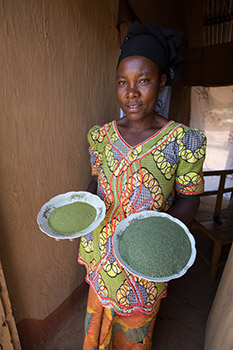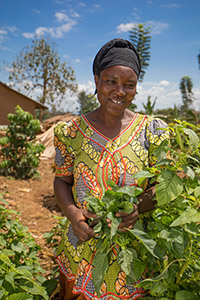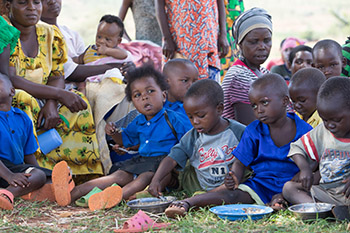Leocadie and her family moved to the Ndego region of Rwanda in 2006. The government of Rwanda had opened an area for settlement and they had heard that land was cheap. With their meager savings, they bought a piece of land for their new farm. They built a traditional mud brick house and began to work the land.
For the first four years, they did quite well. Even though this part of Rwanda does not get as much rain as the rest of the country, Leocadie’s family managed to obtain a good harvest. They were able to establish themselves in the village and purchase some tools and one cow.
In the fifth year, their fortunes turned. Insufficient rain fell and their crops died. Since 2011, that pattern has been repeated. They plant their seeds only to find that very few get enough moisture to germinate. Their dream farmland is slowly turning to desert, becoming drier and drier every year. With such limited yields, they were no longer able to harvest enough to take to market. Even feeding her four children became more and more difficult.

Leocadie shows the powder she has made from the “miracle” moringa tree and the amazing amaranth plant.
In 2014, ADRA arrived in her village to begin a new nutrition project. ADRA began teaching classes on techniques of growing vegetables in dry climates. ADRA distributed specialized seeds that were drought resistant and introduced methods of irrigation that minimized the loss of water to evaporation. For Leocadie, some of the vegetables were new. Before ADRA came, she and her children were eating cassava, beans, maize and sweet potatoes. This limited diet did not provide proper nutrition for her children. They were often sick and not growing well. When she would take them to the clinic, they were always below normal on the growth charts.

The ADRA program introduced Leocadie and her neighbors to a whole new world of nutrition. They learned about the benefits of carrots, spinach, onions, beets and an edible variety of amaranth. The lessons were tasty too! The amaranth is a wonder plant that is easy to grow in dry conditions with almost no irrigation. The leaves are very nutritious and can be mixed in with other foods and served at almost every meal. ADRA also had every family plant a moringa tree in their new kitchen gardens. The moringa tree has taken on the nick name “Miracle Wonder Tree”. The leaves are pounded into powder and also added to foods. It is full of protein and nutrients. It improves appetites and increases the immune system.
In addition to the new greens and vegetables, ADRA started teaching the group of mothers about the importance of a balanced diet for their children. This was a totally new concept for Leocadie. Like many mothers in Rwanda, she thought that as long as she was cooking enough beans and cassava to fill her children up so that they were no longer hungry, she was doing well. ADRA taught her that she needed to provide her family with a variety of foods that contained a good balance of vitamins and nutrients.

To help them get started on the path to good cooking methods, ADRA would gather the mothers in her village together once each month for training, health education and a cooking class where everyone could observe how to cook nutritious meals. Once the food was ready, all the children would sit on the grass and enjoy the delicious meal. In the training classes Leocadie also learned the importance of sanitation and hygiene. Everyone learned about the benefits of keeping the house and clothes clean. They also learned the importance of often washing their hands. She now boils the water they use for drinking and cooking.
Shortly after Leocadie adopted the new methods she learned from ADRA and began feeding her children a balanced diet, she started to notice a big change. They very quickly started gaining weight. They have now caught up to where they should be on the growth charts. They hardly ever get sick anymore and have more energy to face the challenges of living in a dry zone.
She says, “I am very thankful to ADRA for coming to our village and teaching us about the importance of a balanced diet and how to grow the vegetables we need right here in our dry gardens. This has been very great, very helpful, it has really changed our lives!”
The Kuraneza project in the Ndego sector of the Kayonza District of Rwanda is a joint project of ADRA Canada in partnership with the Canadian Foodgrains Bank.
